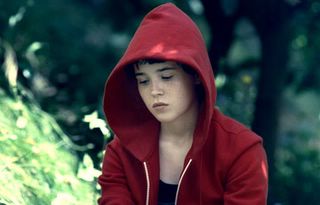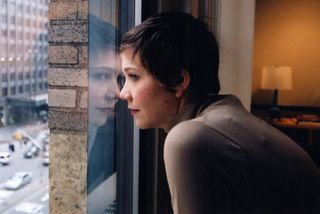Hard Candy
Movies about pedophiles or potential pedophiles really need to stop using Little Red Riding Hood allusions. It's played, folks. Totally played. Yeah, we get it, she's a little girl being lured by a predator into a bed. Ooooohhhh, you're so clever to have thought up that incredibly blatant metaphor for sexual molestation!
The 2004 film The Woodsman starred Kevin Bacon as a pedophile attempting to reform his ways following a prison stint, and its title references the somewhat obscure conclusion to the Red Riding Hood Legend, in which a local lumberjack cuts open the Wolf's stomach to release Red and her grandmother, unharmed. The twisted morality tale Hard Candy inverts the legend, ending with an image of a girl in a red hooded sweatshirt skipping merrily away from the Big Bad Wolf's home.
It's a disappointing ending on several levels. Following up a film that, for all its faults, is ceaselessly inventive and sharp, it feels cloying and obvious. Cinematically, it doesn't really link up with the attitude of the rest of the film, which isn't so much about innocence betrayed as it is about karmic justice. But most importantly, it's just kind of sick and inappropriate. A movie without any acts of heroism falls back on comic book cliche - evil is punished, good wins the day, Little Red Riding Hood and Granny escape the haunted woods with the help of Hansel and Gretel's breadcrumbs, the music swells and we fade out into the sunset.
Sick is definitely an adjective that applies to Hard Candy. At times, it's intentionally off-putting and difficult to stomach. This is basically an exploitation/shock film dressed up as an indie thriller, a harsh revenge film of the kind that once played on 42nd Street.
The extremes aren't so much about testing the limits of common decency, as they are in the films of Takashi Miike. Nor are the shock sequences about challenging an audience to tolerate the sort of brutal depravity that goes on in reality every day, as they are in the films of Gaspar Noe (like Irreversible). This is straight-up cult film stuff, the kind of movie that in one swift transition offers the audience an implicit dare - are you curious enough to tolerate the next hour of cruelty and horror?
Admittedly, the performances and production values are significantly higher on Hard Candy than, say, Hot Spur, Fight for Your Life or Mantis in Lace. Writer Brian Nelson and director David Slade have turned in a film that's so polished, so smooth and so clever that you almost want to forgive it for revelling in the most debased sort of material possible and arriving at a conclusion that's as wrong-headed as it is cynical. Almost.
The screen is entirely taken up by a computer screen as two people chat online. It's a 14 year old girl and a man, presumably a good deal older. They arrange a meeting at a nearby coffee shop. Hayley (Ellen Page) is so precocious and yet so incredibly naive, Jeff (Patrick Wilson) ought to sense trouble wright away. But he's captivated by her. She's clearly smarter than most girls her age, and somehow adult beyond her years. He pretends to defer, but soon enough allows Hayley to convince him to go back to his apartment.
Once there, everything changes. As so often happens with Internet hook-ups, neither Hayley nor Jeff are the people they pretended to be in chat, and reality is about to come crashing down on Jeff's technology-aided fantasy in the form of one sadistic, vengeful little girl.
The notion of indulging in one's forbidden fantasies comes up frequently in Hard Candy. Though he protests his innocence of the worst of the crimes Hayley mentions, Jeff's clearly in this predicament in the first place because he felt the need to seduce an underage girl. The fact that he has fantasized about children sexually in the first place, by Hayley's logic, pretty much opens him up for any punishment that she could possibly dish out. The movie tests this scenario out in a few ways, and alwasy returns to the same conclusion...That nothing Hayley could do to Jeff could possibly equal the evils that Jeff has committed in his own life.
This very well may be true The movie's never exactly clear, there are no flashbacks or any information about events that happened before the actual film takes place. But isn't Hayley just fulfilling some fantasy of her own? The fantasy of visiting crimes back on the criminals? Is vigilantism justifiable, even if it's in direct response to a grave misdeed?
Slade's direction makes it difficult to argue otherwise. He frequently pulls tricks out of the Hitchcock playbook, often with great success, but always in the aid of Hayley's mission. Long monologues and sequences shot in tight close-ups don't just introduce and repeat gruesome unpleasantness but begin to wallow in it to a distasteful degree. Hayley doesn't just describe her nefarious plans for Jeff. She lays them out in loving, exacting detail. She offers diagrams when needed. She picks music and photos appropriate to the occasion. She gets off on making Jeff suffer, just as Slade gets off on tormenting his audience.
(This isn't neccessarily always a bad thing. Hitchcock clearly got off in some ways on tormenting his audience with tension, although that was always in the service of entertainment. Hitch hated actual violence and realistic movie violence, preferring the fantasy of "a delightful little murder" in the classic British style.)
A lot of this material works, at least on a pure filmmaking level, because of the strength of these two performances. As Jeff, Patrick Wilson pulls off easy charm in the beginning and then continues ratching up the panic and anxiety as his dire fate comes into closer relief. It's a really physical performance (he's bound to a chair for the majority of the movie), at times something of a high-wire act, and he never once falters. Even more impressive is young Ellen Page, who clearly has a future ahead of her in this field. Wilson's transition is well-done, but he's got nothing on Page, who smoothy navigates from precocious teen into steely psycho without noticably altering her personality. The way she brings out Hayley's goofy side initially and then slowly reveals the dark, calculating menace beneath is masterful.
But these carefully-crafted performances are in the service of a seriously twisted little film. Will Hayley be found out? Will she be unable to finish her nasty business? These scenes aren't based around the threat of Hayley being caught, mind you, of her being punished for punishing others. It's only based on the threat that she'll be stopped before she's done torturing some guy. Now, I'm sorry, but no matter how bad that guy's sin, I'm not certain it's wise for a film to actively side with a torturer in this way.
Really, for all its aesthetic trappings and excess of style, ins't the entire film Hard Candy kind of a juvenile fantasy itself? In reality, child molesters and rapists and killers get away with it every single day, and there are no Hayleys or superheroes to go around town and manufacture justice. Movies like Daredevil give us flights of fancy about supermen who bounce around imaginary cityscapes in nifty costumes battling evil and rescuing damsels in distress, but at least those kinds of movies openly flaunt their escapist phoniness. Hard Candy seems to desire relevance in the real world, when all it has to offer is a lot of flourishes on top of a bitter, angry and intensely ugly allegory in praise of torture.
Hey, I mean, it's not always the right choice, but if it gets the job done...
I'd talk more about the filmmaking, which is impressive across the board, but I don't want to risk giving away any more of the story than neccessary. If you're going to force yourself through Hard Candy, you may as well see it as intended with the surprises intact. You've been warned. It's tough to get through.
SPOILER ALERT SPOILER ALERT SPOILER ALERT
To make this last point, I'll have to discuss a major plot point of Hard Candy that you shouldn't know before you see the movie. Stop reading if you plan to see Hard Candy and haven't yet.
Okay, the movie lost me with the castration stuff. Not because I can't handle a movie about a guy getting his balls cut off. I've seen disgusting castration scenes in movies before, believe it or not, as well as disgusting scenes of men getting their penises sliced off or penetrated by fish hooks. I can handle it. But the castration plot in this movie is just perverse, with all that build-up and then the cop-out at the end. Goddammit, if you're going to have me sit through 30 minutes of your character lovingly describing how she's going to castrate a guy, shaving his privates and freezing them with ice and promising over and over again that this is going to happen, and then actually enacting the surgery, you've got to cut that guy's balls off for real. Let's stop fucking around, okay? It's for directors with no balls.
Also, I bet Nelson and Slade thought that was a feminist little twist to throw in the movie. "Hey, this guy likes to fuck little girls? Well a little girl is gonna castrate that guy! Bwa ha ha!" But really, this plays into the #1 classic feminist stereotype of all time. What do we say about prototypical angry feminists? That they are castrating little bitches! I mean, come on. Feminists don't really want to cut your balls off, guys. They just want to be treated as equal human beings even though they have different plumbing than you do. Get over yourselves.


